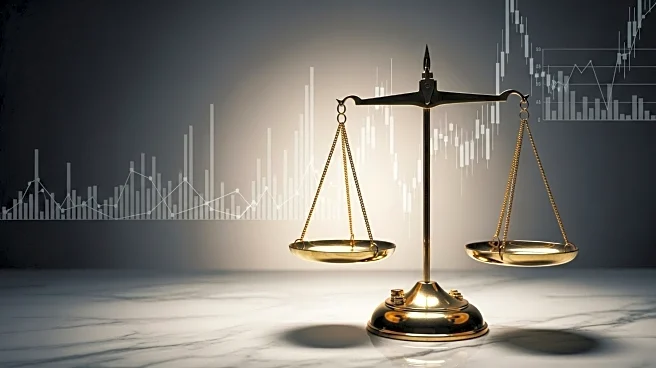What is the story about?
What's Happening?
The Federal Reserve is currently debating a potential rate cut in December, as reported by Nick Timiraos, chief economics correspondent for the Wall Street Journal. This discussion comes amid concerns about economic stability and the risks associated with the Federal Reserve's dual mandate, which focuses on maximizing employment and stabilizing prices. The decision to cut rates would be aimed at stimulating economic growth and addressing potential downturns. The Federal Reserve's cautious approach reflects the complexities of managing monetary policy in a fluctuating economic environment.
Why It's Important?
A rate cut by the Federal Reserve could have significant implications for the U.S. economy, potentially lowering borrowing costs and encouraging investment and consumer spending. This move may be seen as a proactive measure to counteract economic uncertainties and support growth. However, it also highlights the challenges faced by the Federal Reserve in balancing its dual mandate, as rate cuts can lead to inflationary pressures. The decision will be closely watched by financial markets, businesses, and policymakers, as it could influence economic forecasts and strategic planning.
What's Next?
If the Federal Reserve proceeds with a rate cut in December, it may lead to adjustments in financial markets, with investors recalibrating their strategies based on anticipated changes in interest rates. Businesses may also respond by revisiting investment plans and capital expenditures. The decision could prompt discussions among policymakers regarding the effectiveness of monetary policy tools in addressing economic challenges. Stakeholders will be attentive to the Federal Reserve's communications and any signals regarding future policy directions.
Beyond the Headlines
The debate over a rate cut underscores the broader economic uncertainties facing the U.S., including geopolitical tensions and global market fluctuations. It highlights the importance of adaptive monetary policy in navigating complex economic landscapes. The Federal Reserve's decision-making process may also reflect broader concerns about the sustainability of economic growth and the need for coordinated policy efforts to address underlying issues.
















